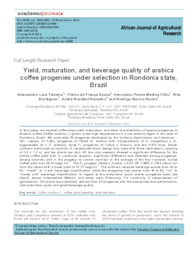Yeld maturation, and beverage quality of arabica coffee progenies under selection in Rondonia state, Brazil.
Yeld maturation, and beverage quality of arabica coffee progenies under selection in Rondonia state, Brazil.
Author(s): TEIXEIRA, A. L.; SOUZA, F. de F.; MEDINA FILHO, H. P.; BORDIGNON, R.; RAMALHO, A. R.; ROCHA, R. B.
Summary: In this paper, we studied coffee bean yield, maturation, and other characteristics of special progenies of Arabica coffee (Coffea arabica L.) grown under high temperatures in a low altitude region in the state of Rondonia, Brazil. We evaluated 29 progenies developed by the Instituto Agronômico de Campinas ? IAC, namely, 24 F2BC2 progenies of Obatã (C. arabica with introgressions of C. canephora) x (C. eugenioides 4n x C. arabica), three F3 progenies of Catuaí x Glaucia, and two H419 lines. Seven cultivars were used as controls. A randomized block design was used with three replications, spacing of 3.0 × 1.0 m, and ten plants per plot. All the crop seasons showed a significant difference for the hulled coffee yield trait. In combined analysis, significant difference was detected among progenies, among controls, and in the progeny vs control contrast. In the average of the four harvests, hulled coffee yield was 29.30 bags ha-1. The F2 progeny Obatã x (Catuaí x EUG DP x MN) C.1594 stood out from the others with a mean yield of 47.37 bags ha-1. The cultivars received beverage scores from 40 to 62, ?rioysh? to ?hard? beverage classification, while the progenies had scores from 40 to 80, ?rio? to ?barely soft? beverage classification. In regard to the maturation cycle, eleven progenies were late (April), eleven intermediate (March), and seven early (February). For continuity of advancement of generations, 104 plants were selected, derived from 22 progenies with the best productive performance, late maturation cycle, and good beverage quality.
Publication year: 2014
Types of publication: Journal article
Unit: Embrapa Rondônia
Observation
Some of Embrapa's publications are published as ePub files. To read them, use or download one of the following free software options to your computer or mobile device. Android: Google Play Books; IOS: iBooks; Windows and Linux: Calibre.
Access other publications
Access the Agricultural Research Database (BDPA) to consult Embrapa's full library collection and records.
Visit Embrapa Bookstore to purchase books and other publications sold by Embrapa.

